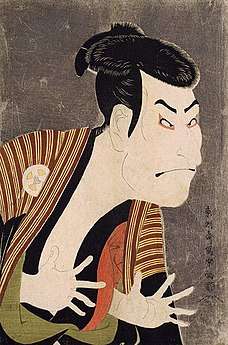Shini-e
Shini-e (死絵, "Memorial prints"), also called "death pictures" or "death portraits", are Japanese woodblock prints,[1] particularly those done in the ukiyo-e style popular through the Edo period (1603–1867) and into the beginnings of the 20th century
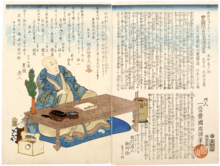
Shini-e of Kunisada by Kunichika, 1864
When a kabuki actor died, memorial portraits shini-e were conventionally published with his farewell poem and posthumous name.[2]
Memorial portraits were created by ukiyo-e artists to honor a colleague or former teacher who had died.
Gallery
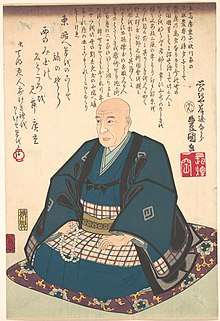 Hiroshige by Kunisada, 1858
Hiroshige by Kunisada, 1858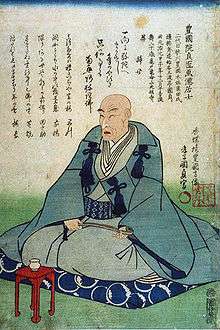 Kunisada by Toyohara Kunichika, 1864
Kunisada by Toyohara Kunichika, 1864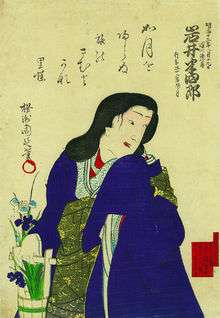 Iwai Hanshirō VIII, by Toyohara Chikanobu 1882
Iwai Hanshirō VIII, by Toyohara Chikanobu 1882
gollark: I know this is inspirobot.
gollark: Where *do* the pictures come from?
gollark: I am not reading your motivational posters because I am very busy.
gollark: Great!
gollark: That would be wildly unstable. No.
See also
Notes
- Takeuchi, Melinda. (2005). "Shini-e (Memorial Pictures)," in The Hotei Encyclopedia of Japanese Woodblock Prints, p. 594.
- Keyes, Roger et al. (1973). The Theatrical World of Osaka Prints, p. 320; Chin, Connie and Melinda Takeuchi. "Actors' Death Prints: Discovery of a New Genre." Archived 2012-10-23 at the Wayback Machine Horizons (Center for East Asian Studies, Stanford University) Fall 2005, p. 7.
References
- Keyes, Roger S. and Keiko Mizushima. (1973). The Theatrical World of Osaka Prints: a Collection of Eighteenth and Nineteenth Century Japanese woodblock Prints in the Philadelphia Museum of Art.Philadelphia: Philadelphia Museum of Art. OCLC 186356770
- Newland, Amy Reigle. (2005). The Hotei Encyclopedia of Japanese Woodblock Prints. Amsterdam : Hotei. ISBN 9789074822657; OCLC 61666175
External links
- Viewing shini-e
- "Shini-e: the Performance of Death in Japanese Kabuki Actor Prints"
- Kuniyoshi project: Shini-e
This article is issued from Wikipedia. The text is licensed under Creative Commons - Attribution - Sharealike. Additional terms may apply for the media files.
